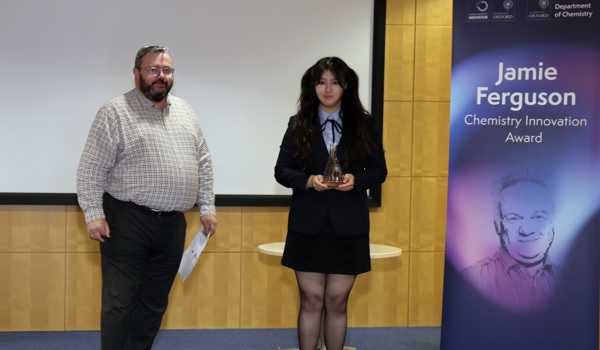Biography
Matthew received both his Bachelor of Engineering and PhD at the University of Queensland. In his time there, he was involved in high-speed flow research using the expansion tube facilities to investigate scramjet engine design and performance, and spacecraft aerothermodynamics and heat transfer. Matthew was also involved in various rocket based flight programmes, flown out of Woomera Test Facility. In 2009, he joined the Oxford Thermofluids Institute as a research associate researching engine realistic turbine internal cooling passage performance and particle deposition in turbomachinery.
Matthew was appointed as an Associate Professor at the University of Oxford in 2013, in the position of Senior Research Fellow in Hypersonics. Matthew has tutored at thermofluids at St Catherine’s, Brasenose and St Hilda’s colleges. In 2021, Matthew was awarded a Senior Research Fellowship from the Royal Academy of Engineering in partnership with MoD. Matthew leads the MoD Academic Centre of Excellence in Hypersonic Science and Technology. Matthew was promoted in 2023 at the University of Oxford to the position of Professor of Engineering Science.
Matthew has established research groups in both hypersonics and particle deposition in gas turbines. Matthew led the development of both the Oxford HDT and T6 hypersonic wind tunnels, which sit in the UK’s National Wind Tunnel Facility. Matthew has supervised 17 graduated doctoral students, published 54 journal articles and 135 conference papers to date.
Most Recent Publications
Propagation and attenuation of sound waves in partially ionised and dissociated plasma flows
Propagation and attenuation of sound waves in partially ionised and dissociated plasma flows
Brazing ZrB 2 ultra‐high‐temperature ceramics to Zr metals for hypersonic thermal protection systems
Brazing ZrB 2 ultra‐high‐temperature ceramics to Zr metals for hypersonic thermal protection systems
Modelling Particulate Deposition in Gas Turbines Part II: Prediction and Validation of Deposition Distributions
Modelling Particulate Deposition in Gas Turbines Part II: Prediction and Validation of Deposition Distributions
Surrogate Thermochemical Kinetics for Nonequilibrium Hypersonic Flows
Surrogate Thermochemical Kinetics for Nonequilibrium Hypersonic Flows
Withdrawn: Vacuum Ultraviolet Emission and Ultraviolet Absorption Spectroscopy in Shock Tube Flows
Withdrawn: Vacuum Ultraviolet Emission and Ultraviolet Absorption Spectroscopy in Shock Tube Flows
Research Interests
- High speed aerothermodyanmics and heat transfer
- Particle deposition in turbomachinery
- Internal cooling heat transfer in gas turbines
Research Groups
Research Projects
Development and upgrades to high enthalpy wind tunnels
Design, build and operation of new ground testing facilities that are capable of replicating conditions encountered by spacecraft and hypersonic vehicles traversing the atmosphere. This includes the Oxford High Density Tunnel, the Oxford T6 Stalker tunnel, the cold driven shock tunnel and the new CXT facility. Continual development of these facilities has facilitated additional testing capabilities.
Heat and shear stress augmentation from ablatives and protuberances
Method development, experimental measurement and correlation of heating from ablative roughness and protuberances in hypersonic vehicles.
Thermochemistry and radiation during planetry entry and atmospheric flight
Diagnostic development and experiments of thermochemical and radiative processes incurred during high speed entry. This is undertaken in either shock tubes or expansion tunnels.
Transpiration cooling and pyrolysis gas effects
Development of experimental techniques, fundamental experiments, numerical models and systems studies of transpiration cooling, pyrolysis gas blowing and combustion for a variety of vehicles.
Numerical simulation of pulse facilities
Development of novel numerical tools to simulate a posteriori using direct experimental measurements. This includes the FROSST, LASTA and NESS tools.
Most Recent Publications
Propagation and attenuation of sound waves in partially ionised and dissociated plasma flows
Propagation and attenuation of sound waves in partially ionised and dissociated plasma flows
Brazing ZrB 2 ultra‐high‐temperature ceramics to Zr metals for hypersonic thermal protection systems
Brazing ZrB 2 ultra‐high‐temperature ceramics to Zr metals for hypersonic thermal protection systems
Modelling Particulate Deposition in Gas Turbines Part II: Prediction and Validation of Deposition Distributions
Modelling Particulate Deposition in Gas Turbines Part II: Prediction and Validation of Deposition Distributions
Surrogate Thermochemical Kinetics for Nonequilibrium Hypersonic Flows
Surrogate Thermochemical Kinetics for Nonequilibrium Hypersonic Flows
Withdrawn: Vacuum Ultraviolet Emission and Ultraviolet Absorption Spectroscopy in Shock Tube Flows
Withdrawn: Vacuum Ultraviolet Emission and Ultraviolet Absorption Spectroscopy in Shock Tube Flows
Selected Publications
- Belrhiti, Y., Kerth, P., McGilvray, M., Vandeperre, L., “Gel-casting for manufacturing porous alumina ceramics with complex shapes for transpiration cooling,” Advances in Applied Ceramics, 2023. https://doi.org/10.1080/17436753.2023.2265204
- Yang, X., McGilvray, M. and Gillespie, D.R., “Sticking–Erosion Model for Ice Crystal Icing Using Particle Size Distribution,” AIAA Journal, Articles in Advance, 2023. https://doi.org/10.2514/1.J062811
- Clarke, J., Di Mare, L. and McGilvray, M., “Spatial Transformations for Reacting Gas Shock Tube Experiments,” AIAA Journal, Vol. 61, No. 8, 2023. https://doi.org/10.2514/1.J062604
- Saad-Ifti, H., Hermann, T. and McGilvray, M., “Analytical Model of Transpired-Coolant Concentration at Downstream Wall in High-Speed Laminar Flow,” AIAA Journal, Vol. 61, No. 8, 2023. https://doi.org/10.2514/1.J062199
- Mee, D.J., Raghunath, S. and McGilvray, M., “Heat-Transfer Gauge Arrays for Identifying Spot Initiation in Hypersonic Transitional Boundary Layers,” Journal of Spacecraft and Rockets, Vol. 60, No. 5, 2023. https://doi.org/10.2514/1.A35662
Most Recent Publications
Propagation and attenuation of sound waves in partially ionised and dissociated plasma flows
Propagation and attenuation of sound waves in partially ionised and dissociated plasma flows
Brazing ZrB 2 ultra‐high‐temperature ceramics to Zr metals for hypersonic thermal protection systems
Brazing ZrB 2 ultra‐high‐temperature ceramics to Zr metals for hypersonic thermal protection systems
Modelling Particulate Deposition in Gas Turbines Part II: Prediction and Validation of Deposition Distributions
Modelling Particulate Deposition in Gas Turbines Part II: Prediction and Validation of Deposition Distributions
Surrogate Thermochemical Kinetics for Nonequilibrium Hypersonic Flows
Surrogate Thermochemical Kinetics for Nonequilibrium Hypersonic Flows
Withdrawn: Vacuum Ultraviolet Emission and Ultraviolet Absorption Spectroscopy in Shock Tube Flows
Withdrawn: Vacuum Ultraviolet Emission and Ultraviolet Absorption Spectroscopy in Shock Tube Flows
Current Teaching
- 4th year undergraduate in Hypersonics & Particle Deposition
- DPhil projects in Hypersonics & Particle Deposition
Most Recent Publications
Propagation and attenuation of sound waves in partially ionised and dissociated plasma flows
Propagation and attenuation of sound waves in partially ionised and dissociated plasma flows
Brazing ZrB 2 ultra‐high‐temperature ceramics to Zr metals for hypersonic thermal protection systems
Brazing ZrB 2 ultra‐high‐temperature ceramics to Zr metals for hypersonic thermal protection systems
Modelling Particulate Deposition in Gas Turbines Part II: Prediction and Validation of Deposition Distributions
Modelling Particulate Deposition in Gas Turbines Part II: Prediction and Validation of Deposition Distributions
Surrogate Thermochemical Kinetics for Nonequilibrium Hypersonic Flows
Surrogate Thermochemical Kinetics for Nonequilibrium Hypersonic Flows
Withdrawn: Vacuum Ultraviolet Emission and Ultraviolet Absorption Spectroscopy in Shock Tube Flows
Withdrawn: Vacuum Ultraviolet Emission and Ultraviolet Absorption Spectroscopy in Shock Tube Flows





